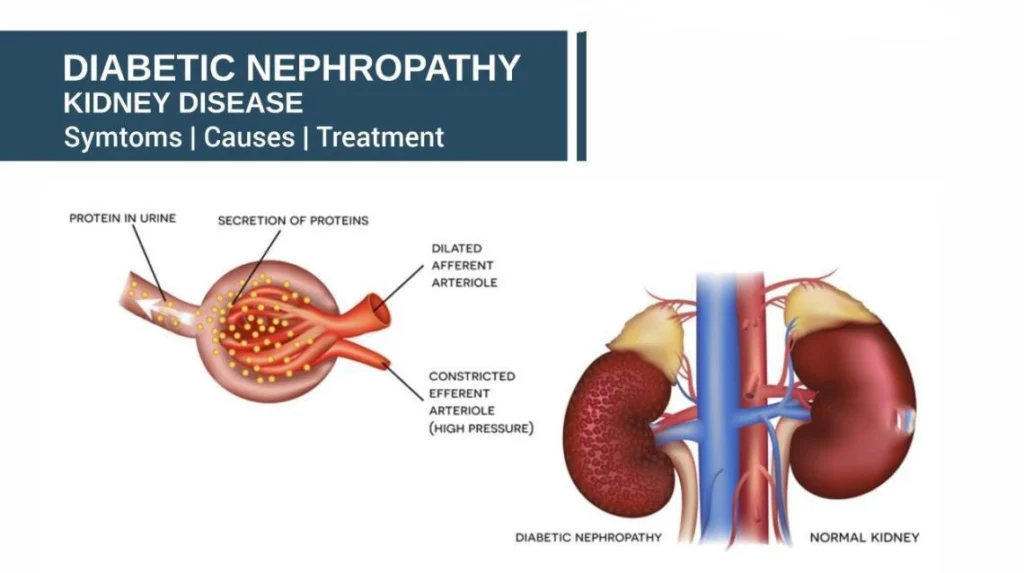Diabetes is a common chronic condition that affects millions worldwide. It is known for its impact on blood sugar levels with effects that extend far beyond glucose metabolism. Diabetic nephropathy is a significant complication arising from prolonged diabetes. Also, it is a kidney disease that often leads to serious health issues. This blog explores the link between diabetes and kidneys, how diabetes affects kidneys, risk factors, and the importance of diabetic nephropathy detection.
Moreover, understanding diabetic nephropathy is crucial for managing diabetes effectively and maintaining overall well-being. Join us as we delve into this important topic and learn how to safeguard your kidneys against the ravages of diabetes.
What is Diabetes Nephropathy?
Diabetes nephropathy is a condition that affects your kidneys. It is also called diabetes-related kidney disease (DKD). Our kidneys act as a filtration system to flush waste from the body. Moreover, kidneys also help balance the body’s fluids and electrolytes. The million nephrons in the kidneys filter our blood and maintain balance.
However, Diabetes causes diabetes-related nephropathy. Therefore, the body can’t process the blood sugar (glucose) from the foods and drinks we consume properly. So, the unprocessed glucose damages the kidney membranes and other parts of the nephron. Also, the unfiltered fluids and toxins that should exit with your pee accumulate in your blood and body.
What is the Link between Diabetes and Kidneys?
Diabetic kidney disease or nephropathy is diabetes’s effect on kidneys. Also, this takes years to develop with no symptoms at first. Diabetes damages the kidneys over time.
Consequently, the kidneys start to lose their ability to filter out wastes leading to toxic build-up in the body. So, as the damage progresses, the patients may lose their appetite, and there may be fluid retention in the feet and other parts.
Moreover, the condition leads to abnormal amounts of protein in the urine. Also, untreated diabetic nephropathy could lead to kidney failure. Hypertension or high blood pressure in diabetics also aggravates kidney damage.
Symptoms of Diabetes Nephropathy
Early diabetic nephropathy does not show any symptoms. However, diabetes-related nephropathy symptoms appear when it has affected at least 80% to 90% of your kidneys.
These symptoms include:
- Swelling in your face, hands and feet (oedema)
- Vomiting
- Fatigue
- Shortness of breath
- Little or no appetite
- Bubbly pee
- Confusion
- Itchy and Dry skin
- Muscle cramps
- Less need for insulin
Also, protein in your pee cannot be detected, unless your healthcare provider conducts a urinalysis. As the disease advances, your kidneys cannot filter the waste from your blood. Consequently, the waste builds up in your body and reaches toxic levels. This is a condition known as uremia. Moreover, uremia often leads to a confused state and the affected person becomes comatose.
What increases the risk of diabetic nephropathy?
On a broad basis, the risk factors for the onset of kidney disease can be divided into controllable and uncontrollable factors.
Controllable factors include:
- Elevated blood sugar levels
- High blood pressure
- Increased protein intake
- Smoking
- Elevated blood lipids (cholesterol and triglycerides)
- Obesity
Uncontrollable risk factors include:
- Old age
- Duration of diabetes
- Diabetes diagnosis under the age of 20
- Concurrent presence retinopathy
- A family history of kidney disease.
The stages of any kidney disease, including diabetes-related nephropathy, include:
- Stage I. Your kidneys have mild damage but still function normally.
- Stage II. You have more damage to your kidneys than in stage I, but they still function well.
- Stage III. You may have mild or severe loss of kidney function.
- Stage IV. You have severe loss of kidney function.
- Stage V. Your kidneys are nearing or at complete failure
Importance of Early Detection
It is crucial to have regular checkups as early diagnosis and strict blood sugar and blood pressure management can help delay and prevent kidney damage. Blood sugar is a significant influencing factor for kidney damage associated with diabetes. However, well-managed blood sugar levels even in cases of advanced kidney damage in people with diabetes can slow the progress of the disease.
Also, effective control of blood pressure levels notably reduces the progression of diabetes-related kidney disease. Therefore, early diagnosis helps in consistent management of blood sugar and blood pressure levels that have a positive effect on diabetes-induced kidney damage and can delay the progression of the disease.
Moreover, if the disease is detected early, initial changes can be reversed and maintained. Undetected elevation of blood sugar levels can damage the walls of the fine blood vessels in kidney membranes. These lead to severe damage and cause a deterioration in blood circulation and kidney function. Hence, as a diabetic, you should see your healthcare provider every three to six months to check your health. Also, your healthcare provider may order the following tests to help diagnose diabetes-related nephropathy:
- Urine analysis
- Blood tests
- Imaging tests
- Magnetic resonance imaging (MRI) tests and computed tomography (CT) scans Kidney biopsy
How can diabetic nephropathy be prevented?
A healthy lifestyle is essential for the prevention of diabetes-induced kidney damage:
- Being Active in everyday life and getting enough exercise.
- Eating a balanced and fibre-rich diet.
- Controlling salt intake and avoiding energy-rich foods and drinks. Avoiding unhealthy fats and free sugars
- Avoid drinking alcohol as much as possible.
- Healthy weight.
- Avoiding smoking
Conclusion
Understanding diabetic nephropathy is your first step towards better kidney health. Now that you know how diabetes affects your kidneys and can spot early warning signs, you’re better equipped to protect yourself. Remember, small changes in your lifestyle and regular check-ups can make a big difference!
We’re here to support you every step of the way. Our team at Apollo Clinic Ulubari, including our experienced nephrologist Dr. Gayatri Pegu Bora and endocrinologist Dr. Mithun Bhartia, is ready to provide expert care tailored to your needs.
Why not take control of your health today? Whether you’re looking for a routine check-up or need guidance on managing your diabetes, we’re just a phone call away. Reach out to us at +91 9085612000 to schedule your appointment. Let’s work together to keep your kidneys healthy and your diabetes in check. Your well-being is our priority, and we’re excited to be part of your health journey.











